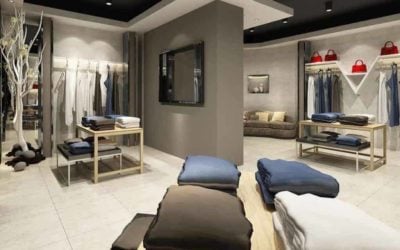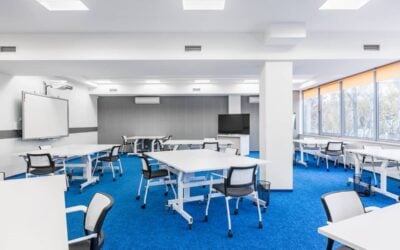How Light Impacts Psychology & Mood in Offices
The amount and type of lighting we encounter throughout the day has a direct effect on our moods. Lighting has an impact on everything from focus to appetite. Poor lighting may even contribute to depression and vitamin deficiencies.
The biological and psychological effects of light impact the health and wellbeing of employees in the office.
Read on to learn about the many ways lighting affects productivity.
Lighting Impacts in Office & Workplace
Lighting plays a significant role in the way offices and workplaces run. Harsh office lighting can bring down employee moods and decrease productivity. Proper lighting, on the other hand, has positive effects on both the functional aspects of a workplace, like visibility, as well as the psychological and emotional aspects, like employee satisfaction and mood.
Functional Light
High quality lighting makes all work tasks easier, whether you are in a home office, traditional office space, or industrial warehouse.
Human beings use sight to take in about 85 percent of information gathered throughout the day. This means lighting that makes it difficult to see has a major negative effect on productivity. It can also cause eye fatigue and headaches as our brains attempt to take in the information we need. When employees can see clearly and without strain, offices are safer and more productive.
Other factors that affect our ability to see properly at work include:
-
- Speed. Quickly moving objects are more difficult to see.
- Size. Very small objects and words are difficult to see.
- Brightness. Too much or too little reflected light both make it more difficult to see objects and words.
- Contrast. Too little contrast between an object or word and its background makes it hard to tell the two apart.
Lighting and Mood
In addition to the functional purposes of proper office lighting, lighting can serve an emotional and psychological purpose.
For example, former psychology professors from the University of Michigan Rachel and Stephen Kaplan found that our minds search for familiarity in new environments. Finding familiar elements helps us to interpret new input, making places feel safer and less intimidating. Even something as simple as a brick wall or familiar art can trigger memories that make a place feel more familiar.
So, how does this relate to office lighting?
Accent lighting can be used to highlight certain elements within a space. Any texture or architectural feature that people may find familiar is worth highlighting.
Highlighting familiarity isn’t the only way lighting can make an environment more psychologically comfortable. Thoughtful lighting can help people feel safe, calm, and focused.
You may wonder—why does lighting matter in an office environment? The best lighting for office productivity helps employees stay focused and raises job satisfaction. This leads to better service for customers and decreased turnover.
Proper Lighting in the Office
Now that we’ve discussed the impact proper lighting can have on an office environment, let’s explore how to enhance your office lighting design for success.
Levels of Light
In any space, it is important to include three levels of light: ambient, task, and accent lighting. These three layers ensure that all functional needs are met. Ensuring three types of lighting are included in every space also creates a more comfortable environment.
-
- Ambient. Typically from overhead, ambient lighting fills the whole space with an even wash of light.
- Task. Task lighting provides bright, focused light on workspaces. In offices, this includes table lamps and swing-arm lamps.
- Accent. Accent lighting is used to highlight certain features of a space, like art, furniture, and architecture.
The direction of light has an impact on our mood, too. According to the Illuminating Engineering Society (IES), intense direct light from above creates a tense feeling. On the other hand, lower overhead lighting combined with warm-toned lighting at room perimeter creates a relaxed feeling.
For work and visual clarity in office settings, the IES recommends bright, cooler-toned task lighting on the workplane, like tables and desks, with less light on walls and around the perimeter.
Lighting Color Temperature for Offices
Lighting color temperature significantly affects the human body. Measured in Kelvin (K), the higher the color temperature, the cooler-toned the light.
Blue Light in the Office
Blue light is a hot topic of discussion right now—and for good reason. Since phones and computer screens give off high amounts of blue light, researchers have begun to study its effect on our brain.
Blue light occurs naturally in sunlight as well as in artificial light. Blue light reduces melatonin, the sleep-related hormone. This means that too much blue light before bed can make it difficult to sleep, or cause sleep quality to be low.
However, this also means that strategic use of blue light wavelengths can keep us alert during the day without impacting sleep later at night. After all, our bodies process blue light from the sun naturally. Blue light from artificial light during the day can serve the same purpose, keeping employees focused and on task even indoors away from the sun.
Warm-Toned Office Lighting
Warm-toned lighting is far less likely to impact our internal clocks and keep us up at night. That is why experts recommend reading before bed with a warm lamp, rather than scrolling through your phone.
Red light in the evening may even promote melatonin, which helps us sleep. For this reason, however, extremely warm lighting is best for environments of relaxation. Overly warm lighting in the office can make employees feel drowsy or tired, decreasing productivity.
Brightness and Dimmability
For the most versatile lighting scheme, it is best to choose dimmable LEDs. This is because the brightness of light may impact the intensity of our emotions. Bright light may intensify emotions, while low light may keep them steady. And, of course, dimmable lights are convenient for functional reasons, like for lowering a room’s brightness for a presentation.
Natural Light in the Workplace
Finally, find ways to incorporate natural light wherever possible to enjoy the benefits of natural light in the workplace. Natural sunlight is incredibly beneficial to mood and mental health, especially in winter months where days are shorter. Windows, skylights, and glass doors let sunlight in, which helps regulate circadian rhythm and boost mood for happier teams and smoother, more productive workdays.
TCP Lighting in Office
Ready to upgrade your office lighting? TCP creates innovative lighting solutions for commercial spaces. From LED flat panel lights to sunlight-mimicking light bulbs, TCP has what you need to create a stunning office space.







